Political Commentary - A Leadership Boost For Gordon Brown And The Government: But Will It Last?
The recent resignation announcement of Prime Minister Tony Blair and the imminent accession of Gordon Brown have been followed by a 'bounce' in Gordon Brown's ratings, both as Chancellor and as a potential Prime Minister. There has also been an increase in the number of Britons who are optimistic about the future of the economy and public services.
Findings from our recent telephone survey in mid-May show that a majority of the British public (55%) are satisfied with the way Gordon Brown is doing his job as Chancellor, with around one in three dissatisfied (35%). These are the best results that Gordon Brown has achieved on this measure since April 2002, which was in the aftermath of the penny rise in National Insurance contributions to increase revenue for the NHS. [note 1]
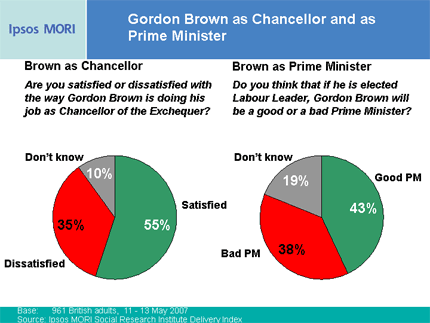
These results are also markedly better for Brown than those recorded after this year's Budget (a Budget which was poorly received by much of the British public). Just after the Budget, one in three Britons were satisfied with the job he was doing as Chancellor (32%), and almost half (45%) were dissatisfied.
More than two in five Britons now believe that Gordon Brown will be a good Prime Minister (43%), slightly more than the proportion who believe that he will be a bad Prime Minister (38%). These again are much improved ratings for Brown in comparison with those found after his Budget earlier in the year, when only one in four believed that he would make a good Prime Minister (25%), and more than two in five that he would not (42%). It appears to be the case that since the Budget, many people who then did not give an opinion either way on Brown are now feeling optimistic about his Premiership. Whether this group will stay positive in the longer term is one of the key challenges facing the prospective Prime Minister.
This positive swing in the public's feelings towards Brown has also had a positive impact on public expectations for the economy and public services generally.
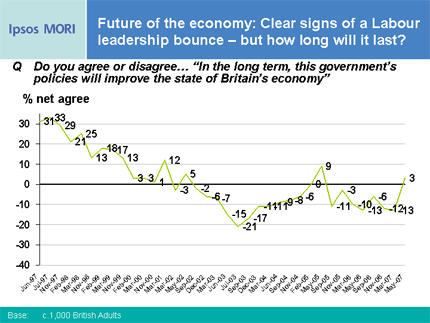
In our latest Delivery Index survey, which also took place in mid-May, economic optimists among the British population outnumber the pessimists (44% believe that the economy will improve as a result of the Government's policies, while 41% believe it will get worse). This net optimism score of +3 is sixteen points up on that recorded in March this year, and is the first time that the optimists outnumber the pessimists since the brief post-election 'honeymoon' in 2005.
There has been a similar increase in the number of optimists on the Government's ability to improve public services, with net optimism here having improved from -28 in March to -13 now (although as the net score indicates, optimists are still outnumbered by pessimists by 38% to 51%).
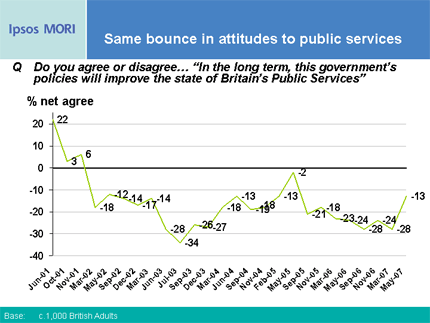
The Government will be relieved that there has been a similar increase in the proportion of Britons who are optimistic towards the NHS, but the balance of opinion remains negative. Net optimism is now -14, up from -30 in March. These latest results reverse what had been a long-term decline in public optimism about the NHS, which had recently seen the highest levels of pessimism ever recorded since the Delivery Index started in 2002.
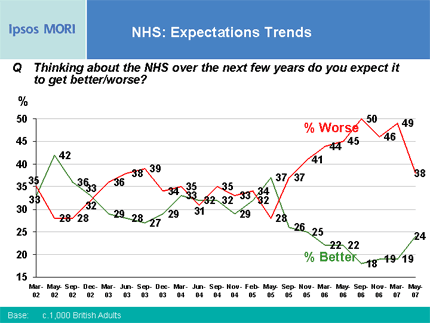
Both Gordon Brown and the Labour Government will be keen that such a sharp increase in public optimism does not prove to merely be a short-term leadership 'bounce' and, instead, is the starting point of sustained increases in the public's belief in the Government's ability to deliver. Previous Delivery Index waves have also recorded short-term improvements in the public mood in the immediate aftermath of key events, such as a General Election, after which the public's prevailing (and more negative) mood is quickly restored. Labour cannot afford for this to just be another 'bounce' as they seek to re-establish a lead in the public's affections in advance of the next General Election. Nevertheless, this represents an encouraging initial platform for the Brown Government to build on.
Are the Lib Dems being 'squeezed?'
A further noticeable trend in recent Delivery Index waves is that supporters of the Liberal Democrats have gradually become more optimistic about the Government in recent month -- such as on their ability to improve public services and the NHS. Might this increasing popularity of the Government among Liberal Democrats indicate that their 'left-leaning' supporters are preparing to return to support the Labour Party perhaps to fend off the challenge of David Cameron's Conservatives or as blame for Labour about the Iraq War declines with a change of leader?
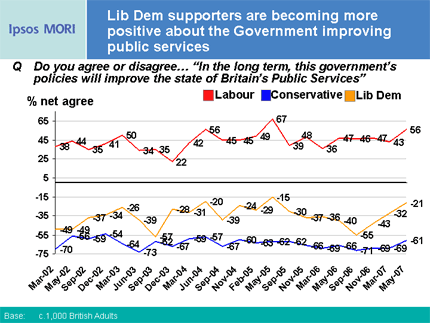
Ipsos interviewed c.1,000 adults aged 18+ across Great Britain every quarter, by telephone. Results are weighted to the profile of the population.
Notes
- Please note that there are methodological differences between this telephone survey and the face-to-face interviewing that we usually use for this indicator.



